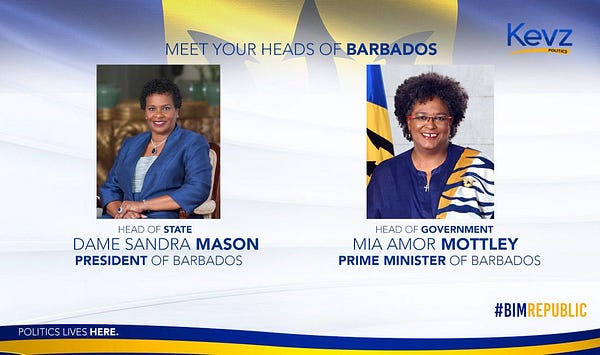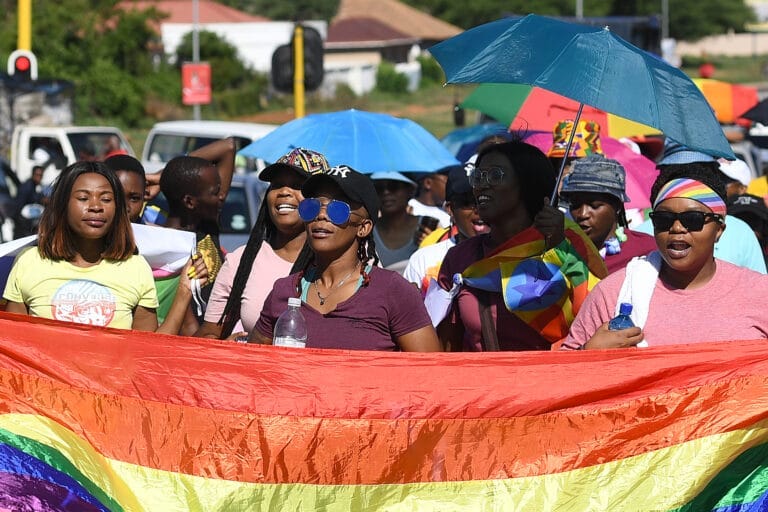Global Roundup: Progressive Female Imams in LA Mosque, New Female Leadership in Barbados, Malaysian Rapper Fighting Taboos, Huge Win for Botswana’s LGBTQ+ Community, Clothes for Trans Youth in the UK
Compiled by Inaara Merani
Photo via The Guardian
The Women’s Mosque of America in Los Angeles is the first women-led mosque in the US. Here, over 150 women have been trained to deliver a khutbah (sermon), lead prayer ceremonies, recite the adthan (call to prayer), or take on a position of leadership within the mosque for the first time. This mosque is breaking stereotypes and paving the way for female Muslims in LA, speaking about unaddressed issues such as sexual violence, pregnancy loss, and domestic violence.
One of the imams, 37-year old Tasneem Noor, has been leading prayers at this mosque for a few years now but still faced criticism and scepticism for her role as a female imam. Growing up in Karachi, Pakistan, women were not allowed to attend mosques (this has since changed), however she still remained staunch in her faith with her mother as a role model.
This is not a career. It is not something I do to make money. This is my calling, my responsibility, as the creation of the ultimate creator. - Tasleem Noor
When her family immigrated to California when she was 16, she was able to attend a giant prayer for Eid at the LA convention centre; this moment was defining for her as she realized what she wanted to do with her love for her religion.
When the Women’s Mosque of America opened in 2015, Noor and her sister became the most active members, and have since begun leading khutba. They have faced backlash from Muslims who believe that women should not lead prayer ceremonies, but they have combatted this criticism with resilience, demonstrating that Muslim women will not be confined in the roles they play.
Barbados’ Prime Minister Mia Motely (L) asks the country’s new President Sandra Mason (seated R) to make Barbadian singer Rihanna (C) the country’s 11th National Hero during a ceremony to declare Barbados a republic. Randy Brooks/AFP via Getty Images via USA Today
Yesterday, Barbados made headlines around the world as they became a republic for the first time in the nation’s history. The country has stopped pledging allegiance to the Queen, and will now follow the leadership of their Prime Minister, Mia Mottley, and President, Sandra Mason.
The ceremony took place on Monday, where many notable figures were present, and fireworks lit up the night. The ceremony was also broadcast live online, which prompted congratulatory messages from Bajans around the world.
The move to become a republic began over 20 years ago, however only this week was the motion set in place. The process ended with the Barbados Parliament electing the nation’s first female president, Sandra Mason, last month and swearing her in on Tuesday.
As cautioned by our first prime minister ... we ought no longer to be found loitering on colonial premises. We must seek to redefine our definition of self, of state and the Barbados brand in a more complex, fractured and turbulent world. ... Our country and people must dream big dreams and fight to realize them. - President Sandra Mason
Although Barbados became independent from the UK in 1966, the nation continued to recognize the Queen as head of state. While this will not be the case anymore, Barbados will still remain a member of the Commonwealth.
In recent decades, Barbados began distancing itself from the Commonwealth and the colonial era. In 2005, the island chose the Trinidad-based Caribbean Court of Justice as its final court of appeal, turning away from the Commonwealth’s Privy Council. Additionally, last year the nation announced its plans to stop being a constitutional monarchy and removed a statue of a former British nobleman.
During the ceremony, the prime minister awarded pop star Rihanna the honor of National Hero of Barbados, telling her, “May you continue to shine like a diamond,” as they both laughed.
The two women leaders have announced their way forward and will be making history as they carry out their plans and abandon Barbados’ colonial legacy.
Tweet:


Source: Yahoo News
SYA is a Malaysian rapper who is fighting taboos and stereotypes of Muslim women. The artist recently signed with Def Jam, a major label for artists around the world. Her debut single “PrettyGirlBop” addresses misogyny and acceptance in Malaysia, which has a large Muslim population.
I just want women to feel more comfortable in their own skin...I don’t have to pretend to be somebody else just to fit what society deems is good. - SYA
Her music video begins with SYA dressed in all white, and then transitions to her wearing a leopard print jacket and holding a snake – the intention was to show that women should not be labelled, nor should they have to conform to labels. Despite her rise to fame and the messages that she sends, SYA has still faced online abuse from individuals questioning her faith and her character as a whole.
SYA is a firm believer that religion and art should remain separate. She has said that she is confronting the patriarchal mindset and the sexualization of women who don’t fit into the stereotypical “ideal Muslim woman”.
What does (religion) have to do with me as an artist, and what I create? - SYA
SYA has also addressed the double standard that women face in the hip-hop industry. Men have the freedom to rap about controversial topics without facing criticism, but women still remain in the spotlight for talking about the same issues.
For the boys, there are no limitations. If they want to rap about sex or weed, it is a pass. But for women, if you are Malay, you don’t want to insinuate you are doing all of those things. - SYA
Despite the criticism and the labels forced onto her, SYA has remained strong and wants to continue to use her platform to address these stereotypes about Muslim women.
PrettyGirlBop video:
Source: Pink News
In 2019 the Botswana High Court decriminalized same-sex relations, a huge win for the LGBTQ+ community. Prior to this ruling, same-sex relations were punishable by up to seven years in prison. In July 2019, this ruling was challenged when the nation’s attorney general launched an appeal to recriminalize the act, and return to colonial-era law.
The Botswana High Court rejected this appeal on Monday, and has now upheld the law that same-sex relations between men are legal and the act cannot be criminalized. The decision was unanimous among the Court of Appeal’s five judges.
A huge win for the LGBTQ community in Botswana, as the country’s Court of Appeal has upheld a 2018 ruling, decriminalising consensual same-sex relationships. Congratulations to the LGBTQ community, especially activists and those who led this good fight. - Rightify Ghana, human rights group
Despite this landmark decision, however, same-sex couples still do not have legal recognition in Botswana. While this is a step forward, there still remains a larger battle for the LGBTQ+ community in Botswana, and activists and allies are not backing down anytime soon.
This incredibly life-changing decision, although it does not right all the wrongs done to individual members of the LGBT community, is a step towards restoring our dignity as human beings. The decision has several implications for the LGBTIQ community… Not only does it provide legal affirmation and recognition of the rights of LGBTIQ persons, but it allows an important space for addressing public health issues more efficiently and effectively. We can finally start building a more tolerant society. The real work starts now. - Anna Mmolai-Chalmers, CEO of Lesbians, Gays, and Bisexuals of Botswana (LEGABIBO)
Source: Open Democracy
In 2017, genderqueer activist and educator Santiago Sorrenti launched G(end)er Swap, a London-based clothing swap. The organization was launched to create a safe space for trans and gender nonconforming people to find gender-affirming clothes, as well as a community that they could turn to.
Mainstream fashion brands don’t make clothes for trans and gender non-conforming bodies. It can be difficult to find sizing and cuts that fit. - Santiago Sorrenti
When G(end)er Swap first began, Santi realized that there was a huge demand for transitional items including wigs, make-up, and binders. With limited resources for young people wanting to transition, Santi wants to ensure that trans and gender nonconforming individuals are equipped with the knowledge and resources they need.
Trans people often have to wait years for a first appointment with a specialist in the UK, even though the NHS has a legal obligation to provide one within 18 weeks of a referral. This difficulty is exacerbated for young people who can only access this support by going to the publicly funded gender clinic, Gender Identity Development Service (GIDS), which only has two locations across the country.
Last year, G(end)er Swap partnered with an American company that sells binders, GC2B, to provide hundreds of free binders to transmasculine people in the UK, as well as users at LGBTQ+ rights charities in countries such as Bulgaria and Nigeria. Individuals can also purchase second-hand bindes on the G(end)er Swap website, or at in-person collection points for a small donation.
For trans and gender nonconforming people, clothing and fashion is an integral aspect of their queer identity, however it can be an expensive endeavour. G(end)er Swap was created so that young or low-income trans people do not have to spend a fortune trying to dress comfortably and for themselves.
The project has now expanded, based on feedback from the trans community, and has run programs such as styling tips for trans students, trans-awareness training for retail staff, and support for trans women in prison through donations of clothing and makeup. Additionally, Santi has delivered more than 100 workshops for trans and gender nonconforming people and allies since 2017.
I would love for there to be physical locations for people to go to, to find clothes and binders, to attend workshops – an ongoing community space, like a trans-safe clothing haven...Queer community is so important because it's where we feel safe, form our chosen families and find lifelong kinship. It’s where we feel free to be ourselves. - Santiago Sorrenti
Inaara Merani (she/her) is currently completing her Master’s degree at Western University, studying Gender, Sexuality, and Women’s Studies with a collaborative specialization in Transitional Justice and Post-Conflict Reconstruction. She is an Ismaili Muslim Canadian who is deeply passionate about gender equality and social justice and in turn, dismantling the patriarchy and ensuring that all women and vulnerable populations have safe and equal access to all their rights. She hopes to pursue a career in law so that she can continue to fight for the rights of women and other marginalized groups everywhere. She also enjoys reading, travelling and spending time with her beautiful cat.








